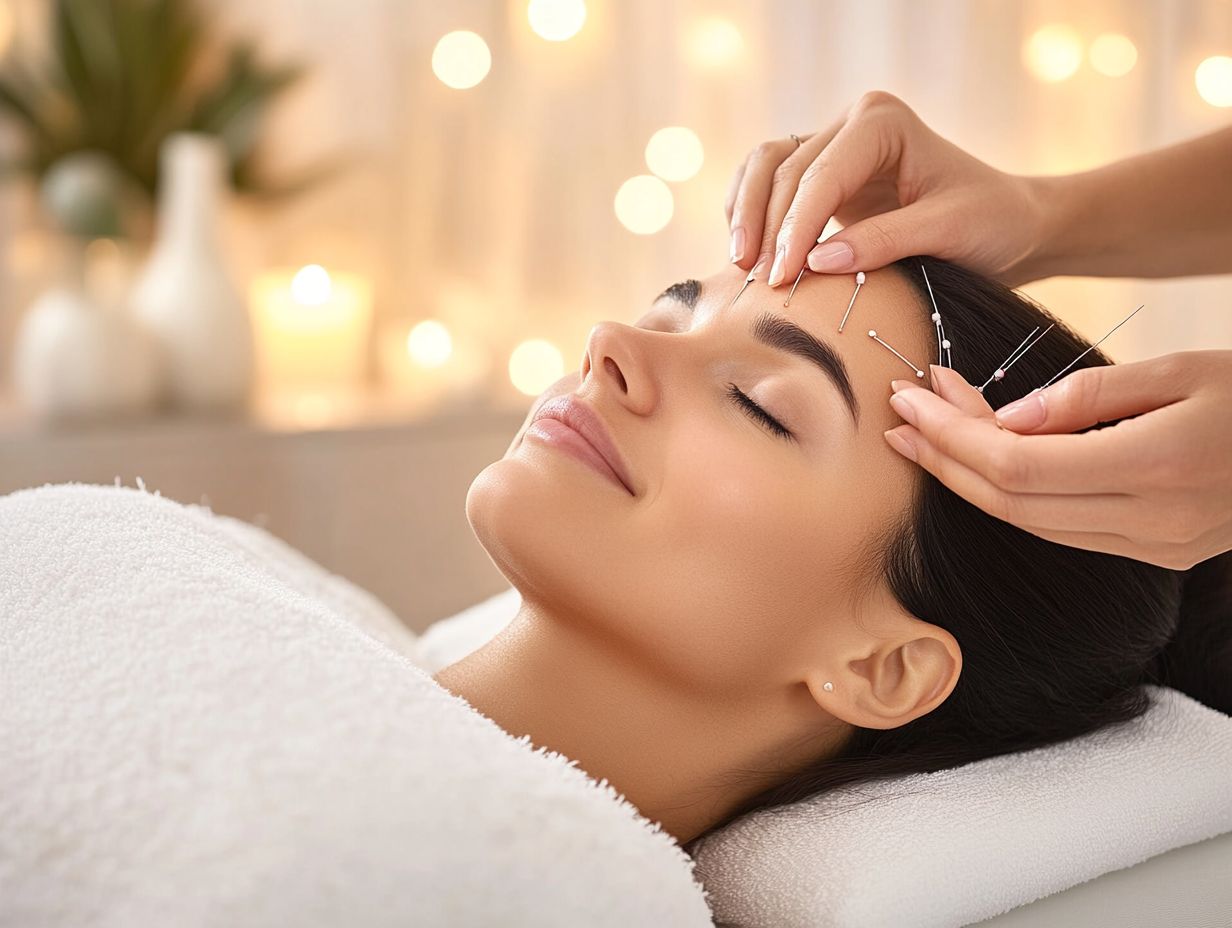Acupuncture for Women’s Health: Key Insights
Acupuncture is an ancient practice rooted in traditional Chinese medicine. It offers a holistic approach to women’s health.
This technique provides numerous benefits, addressing conditions such as menstrual irregularities and stress relief. You will explore the mechanics of acupuncture for women, common treatments, safety concerns, and guidance on choosing the right practitioner.
Discover how to integrate acupuncture into your health routine to elevate your overall well-being.
Contents
- Key Takeaways:
- Understanding Acupuncture
- Benefits of Acupuncture for Women’s Health
- How Acupuncture Works for Women’s Health
- Acupuncture Techniques and Targeted Areas
- Safety and Risks of Acupuncture
- Potential Side Effects and Precautions
- Finding the Right Acupuncturist
- Incorporating Acupuncture into Your Health Routine
- Frequently Asked Questions
- What is acupuncture and how can it benefit women’s health?
- How does acupuncture help with menstrual cramps?
- Can acupuncture help with fertility?
- What are some other conditions related to women’s health that acupuncture can help with?
- Is acupuncture safe for pregnant women?
- How Many Acupuncture Sessions Do You Need for the Best Results?
Key Takeaways:

Acupuncture has been used for centuries and is based on the principles of Traditional Chinese Medicine.
For women’s health, it can effectively treat menstrual cramps, menopause-related symptoms, and fertility issues.
This technique stimulates specific points on the body using thin needles. It s crucial to find a qualified acupuncturist for safe treatment.
Understanding Acupuncture
Acupuncture is a cornerstone of Traditional Chinese Medicine (TCM) with a history spanning thousands of years. It focuses on the energy flow, known as qi, within your body.
In TCM, achieving hormonal balance and overall well-being is vital. This holistic view resonates with modern medical practices.
As you explore acupuncture, you will learn about its foundational principles and philosophy. This ancient technique aims to restore harmony within your body, enhancing both physical and emotional well-being.
Benefits of Acupuncture for Women’s Health
Acupuncture offers many benefits specifically for women’s health. It effectively addresses conditions like menstrual irregularities, fertility challenges, menopause symptoms, and emotional well-being.
This practice alleviates pain and promotes hormonal balance. It significantly enhances your quality of life as you face various health challenges.
By incorporating acupuncture into your wellness routine, you embrace a holistic approach to managing both physical and emotional concerns. It s becoming a popular choice for those exploring alternative therapies.
Common Conditions Treated
Acupuncture is a powerful ally for various women’s health concerns. It addresses issues like fertility problems, menopause-related hot flashes, and irregular menstrual cycles.
Women dealing with conditions like PCOS and endometriosis often find relief through this practice. Its versatility in treating diverse ailments is remarkable.
The benefits also include managing PMS symptoms and reducing anxiety from hormonal changes. Precise needle placements help regulate your menstrual cycle and ease discomfort.
For those facing postpartum challenges, such as mood swings or recovery, acupuncture can greatly improve your well-being. This holistic therapy promotes relaxation, essential for emotional stability.
Acupuncture offers a comprehensive approach to better health and an enriched quality of life for women, especially when combined with naturopathy for women’s health.
How Acupuncture Works for Women’s Health

Acupuncture aims to restore hormonal balance and utilize the body s natural healing abilities. It s an excellent choice for addressing women’s health concerns.
Practitioners focus on specific acupuncture points to activate energy pathways, enhancing circulation and immune function. This process alleviates pain and promotes overall wellness.
Many clinical trials support its effectiveness, showing how acupuncture can improve menstrual irregularities, fertility issues, and menopause symptoms. Don t wait to enhance your well-being!
Acupuncture Techniques and Targeted Areas
Acupuncture techniques involve the precise insertion of fine needles into specific points on your body, known as acupuncture points, which are closely connected to various organs and systems. This allows for targeted treatment tailored to your unique needs.
These techniques are designed to influence the flow of qi, which means life force energy, restoring balance and alleviating pain while enhancing hormonal stability and overall well-being. Practitioners focus on areas that support women’s health needs, ensuring that each session resonates with your individual requirements.
For instance, if you’re seeking relief from menstrual discomfort, targeting the abdomen can be highly effective. Targeting points in the lower back may enhance blood flow to reproductive organs. Techniques like ear acupuncture can stimulate specific reflex points related to emotional well-being, further enriching your holistic approach to health.
Every technique is selected based on your unique condition, highlighting the interconnectedness of the body s systems and the necessity of balanced qi for optimal health outcomes. As practitioners guide you through these therapies, they help cultivate a personalized journey toward improved vitality and harmonious living.
Safety and Risks of Acupuncture
Acupuncture is typically regarded as a safe practice when conducted by a trained and licensed practitioner. However, like any therapeutic approach, it carries potential risks and side effects that warrant your attention.
Commonly reported side effects include minor bruising, soreness at the needle site, and fleeting emotional responses, which can vary based on your individual sensitivity and the type of treatment.
It s essential to take precautions, particularly for women undergoing endocrine therapy or those with specific health conditions, to ensure your experience is both safe and effective.
Potential Side Effects and Precautions
While acupuncture is generally seen as a safe practice, be aware that mild side effects can occur, such as slight fatigue, dizziness, or emotional fluctuations none of which are usually serious.
By understanding these potential effects and taking precautions, like consulting with your healthcare provider, you can enhance your overall experience and the effectiveness of acupuncture in improving your emotional well-being and managing pain. Clinical trials have documented these experiences to better prepare you for what to expect when starting treatment.
Research shows that most people report only temporary and mild reactions after treatment; however, some may notice transient bruising or increased sensitivity at the needle insertion sites.
It s crucial to discuss any pre-existing medical conditions or allergies with your acupuncturist to minimize potential risks. Open communication helps practitioners personalize your care, ensuring you receive more focused attention.
Studies indicate that patients who are candid about their health history tend to achieve better therapeutic outcomes, reinforcing the significance of this dialogue throughout the acupuncture process.
Finding the Right Acupuncturist

Selecting the right acupuncturist is essential for a safe and effective treatment experience, particularly when addressing women s health concerns such as fertility, menopause, and hormonal balance.
Consider several key factors, including the practitioner s qualifications, their experience with your specific conditions, and their approach to care, all of which should resonate with your personal health goals.
Prepare thoughtful questions to assess their expertise and understanding of Traditional Chinese Medicine (TCM) principles, ensuring you receive the quality care tailored specifically to your needs.
Factors to Consider and Questions to Ask
When selecting an acupuncturist, consider several factors, such as their training level, experience with women’s health issues, and their approach to overall health care.
It’s important to ask questions about their treatment philosophy and familiarity with specific conditions like PCOS or menopausal symptoms. Inquire about how they measure treatment success in relation to your health goals.
Also, find out about their availability for follow-up sessions, as continuity of care can significantly enhance your overall treatment experience. Understanding how the practitioner tailors each session to meet your individual needs is crucial; personalized approaches often yield better outcomes.
It s wise to ask about their methods for maintaining a sterile environment and ensuring your safety.
Explore how an acupuncturist includes dietary advice, lifestyle changes, or other complementary therapies into their practice. This can provide valuable insights into their overall health care approach.
These inquiries empower you as a patient and foster a productive dialogue that builds trust and clarity.
Incorporating Acupuncture into Your Health Routine
Incorporating acupuncture into your health routine can profoundly enhance your overall well-being by addressing various women’s health concerns, including pain relief, hormonal balance, and emotional wellness.
To maximize the benefits of acupuncture, establish a consistent treatment schedule, engage in open dialogue with your practitioner, and complement your sessions with lifestyle adjustments. Focus on mindful nutrition and effective stress management.
This holistic approach can lead to significant improvements in your quality of life, creating a more balanced and fulfilling existence.
Tips for Maximizing the Benefits
To truly reap the benefits of acupuncture, embrace complementary practices that elevate the treatment’s effectiveness and support your overall health and well-being.
Consider focusing on whole, nutrient-rich foods that are healing powerhouses, such as vibrant fruits, crisp vegetables, wholesome grains, and lean proteins.
Regular exercise whether through yoga, brisk walking, or strength training can enhance circulation and flexibility, magnifying the positive effects of your acupuncture sessions.
Incorporating stress management techniques, such as meditation or deep-breathing exercises, can help cultivate a serene mind and body, fostering an environment ripe for healing.
The synergy between these holistic practices and acupuncture can lead to not only symptom relief but also a more profound, sustainable sense of well-being.
Frequently Asked Questions

What is acupuncture and how can it benefit women’s health?
Acupuncture is a traditional Chinese medicine practice that involves inserting thin needles into specific points on the body. It has numerous benefits for women’s health, including helping with menstrual cramps, fertility, menopausal symptoms, and more.
How does acupuncture help with menstrual cramps?
Acupuncture can help alleviate menstrual cramps by promoting blood flow and relaxing the muscles in the pelvic area. It can also help regulate hormones and reduce inflammation, which can contribute to cramping.
Can acupuncture help with fertility?
Yes, acupuncture has been shown to improve fertility in women by regulating hormone levels, reducing stress, and improving blood flow to the reproductive organs. It can also address underlying conditions that may cause fertility issues.
Acupuncture can also benefit conditions such as menopausal symptoms, PMS, endometriosis, PCOS, and more. It can help regulate hormones, reduce pain and inflammation, and improve overall well-being.
Is acupuncture safe for pregnant women?
Yes, acupuncture is generally safe for pregnant women and can help with common pregnancy-related issues such as morning sickness, back pain, and fatigue. However, consult with a licensed acupuncturist and inform them of your pregnancy before starting treatment.
How Many Acupuncture Sessions Do You Need for the Best Results?
Your needs may vary based on your condition. Most people benefit from 6 to 12 weekly sessions.
Some feel relief after just a few appointments. Others might find that ongoing maintenance is necessary.






